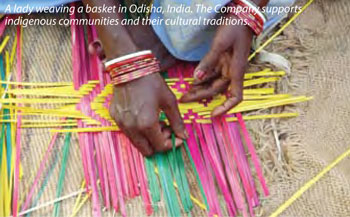| |
 |
The Founder of the Tata Group, Jamsetji Tata conceived Tata Steel to be a conduit to the economic freedom for the people of India. He emphasised on considering the interests of the shareholder, and the health and welfare of employees as the sure foundation of success. This defined the purpose and nature of Tata Steel's relationships with its stakeholders.
|
A stakeholder approach to business
Tata Steel identifies its stakeholders based on voluntarily accepted obligations and those whose interests it must address in the value creation process. Strategic planning and risk management processes systematically collect and analyse information on existing and emerging stakeholders and continually define organisational priorities.
In Europe, the Company has adopted a common pan European system that allows it to identify, map and target the most relevant stakeholders. The Company's Public Affairs team also conducts regular reviews of stakeholder lists across the European operations.
|
Communicating with stakeholders on the impact of the Company's actions
Tata Steel engages with stakeholders prior to the implementation of policies or actions that are likely to have an impact on them. Here is an overview of the communication process:
- Customer concerns regarding cost, delivery, value added products, quality complaints and safety and environmental issues are addressed through special customer meets, satisfaction surveys and dedicated customer teams.
- The Company helps suppliers and vendors increase their capability through various training sessions, vendor meets and surveys.
- For employees, issues such as career planning, compensation, growth training and development
are addressed through dialogues, Joint Development Councils, Performance Management System, etc. For issues related to health and safety, the Company focusses on the Safety Excellence Journey, the Wellness@Workplace programme and other training events.
- The Company interacts on a regular basis with the community, through public hearings and meetings with various groups such as the Zila Parishad, Senior Citizens, tribal leaders and groups, and local leaders.
- The Company uses the forums of the Annual General Meeting, analyst meetings and investor road shows to meet with investors and address issues of performance, long-term strategy and growth plans.
- Tata Steel regularly holds meetings with Governmental bodies that are connected to the steel industry, for example, the Pollution Control Boards, Tax Departments, Central and State Ministries and other influential groups.
- As a publicly listed company, Tata Steel interacts with the media, releasing information as required on various issues and in compliance with the Listing Agreement.
- Tata Steel is an active and important member of various industry forums in India and around the world and plays an important role in policy formation and business development.
|
Serving local and indigenous communities
The nature of Tata Steel's operations in India have given it a presence in both urban as well as rural locations in the states of Jharkhand, Odisha and Chhattisgarh. These are regions with a substantially higher proportion of indigenous communities than the national average.
Among the communities that Tata Steel operates in, it is viewed as the primary source of employment and the Company responds by making its communities beneficiaries of this economic activity, directly and indirectly.
The Company has created multiple agencies with well-defined purposes. These include Tata Steel Rural
Development Society, Urban Services and the Tribal Cultural Society. These agencies focus on sustainable
livelihoods, employability, health care, education, empowerment, population stabilisation and ethnicity.

A lady weaving a abasket in Odisha, India. The Company supports
indigeneous communities and their cultural traditions.
In Thailand, the Company operates in the Amnart Charoen and Yasothon provinces. Its 'Grow Smart with Tata Steel' project reached out to 158 schools within the region in 2011-12. NatSteel's 'Building beyond Borders' programme reaches out to children with physical disabilities or physically disabled parents, under the NatSteel-SPD Education Bursary Award. The Company also partners charities for community projects.
|
|
An advocate for a just, fair and equitable society
Tata Steel's proactive approach to stakeholder engagement and conflict resolution has been rewarded
with over eight decades of industrial harmony and the continued license to operate in the very communities it
began operations in, over a century ago. The Company takes pride in being the employer of choice in several
instances to four generations of the same family.
At all greenfield sites, the Company diligently follows processes as defined by law. The Company's first greenfield project at Kalinganagar is focused on meeting the Millennium Development Goals in 21 villages, 14 of which are directly project-impacted.
|
 |
SUSTAINABILITY IN ACTION
|
|
The Company plays an active role in the urban administration of Jamshedpur. In 2004, the city was nominated as the first South Asian city for the pilot phase of the UN Global Compact Cities Programme. The programme aims at resolving intractable urban problems and replicating these solutions worldwide. Tata Steel's Public Private Partnership Project, which gives last-mile consumer access to safe water was hailed. The Company's engagement with UNGC has deepened with its membership of CEO Water Mandate, which focuses on development through better utilisation of natural resources. In the Third Party Survey conducted in 2011-12, the citizens of Jamshedpur rated it as the second-best city to live in, in India. |
|
|
|
|